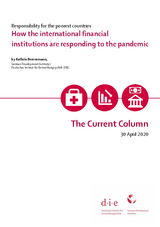The Current Column
Responsibility for the poorest countries
How the international financial institutions are responding to the pandemic
Berensmann, KathrinThe Current Column (2020)
Bonn: German Development Institute / Deutsches Institut für Entwicklungspolitik (DIE), The Current Column of 30 April 2020
World Bank Group President David Malpass expects the corona crisis to result in a deeper global recession than the Great Depression of the 1930s. The pandemic will hit the world’s poorest countries even harder than industrialised nations, especially as the former have barely any fiscal leeway. Their social-security and healthcare systems are not sufficiently robust. The particular vulnerability of the poorest countries also results from the one-sided focus of their economies, most of which are geared primarily to the export of certain commodities and products. Additionally, the International Monetary Fund (IMF) and the World Bank estimate that around half of low-income countries were already heavily in debt before the crisis. And more poor nations will become highly indebted as a result of the pandemic.
Consequently, the world’s poorest countries will be unable to cope with the corona crisis on their own. The international community and, in particular, the international financial institutions such as the World Bank and the IMF, should take a leading role in providing financial assistance, to these nations in the short and medium term. According to the World Bank Group President, without swift action on this front, the development gains made by these countries in recent decades will be lost.
The World Bank and the IMF have responded quickly, deploying a number of instruments to provide a relatively high degree of liquidity to developing countries at short notice. The IMF will provide around USD 50 billion in emergency lending to the poorest countries and emerging markets. About USD 10 billion will be offered interest-free to the poorest countries by the Rapid Credit Facility and about USD 10 billion by the Rapid Financing Instrument to emerging markets. The IMF has temporarily doubled the annual accessible volume of these two emergency finance facilities. 44 African nations had already requested financial assistance under these two instruments by mid-April. The IMF has accelerated its internal disbursement procedures to ensure that countries receive the funding more rapidly. The IMF has also reformed its Catastrophe Containment and Relief Trust to provide debt service relief to more poor nations simultaneously and at short notice. The reforms include payment in tranches and for a maximum period of two years.
The World Bank Group will provide around USD160 billion for developing countries over the next 15 months. As part of a fast-track COVID-19 facility alone, the group is providing USD 14 billion of advance payments. This allows the bank to disburse funding to countries more quickly. USD 6 billion of this finance will be disbursed via the institutions for poor countries (International Development Association) and via the institution for middle-income countries (International Bank for Reconstruction and Development). The International Finance Corporation, the World Bank Group's institution responsible for the private sector, will provide USD 8 billion in support for private enterprises, with a particular view to averting mass redundancies. 25 countries, 10 of them in sub-Saharan Africa, will already receive assistance in the first group. Furthermore, the Multilateral Investment Guarantee Agency provides swift guarantees for a volume of USD 6.5 billion to combat the coronavirus.
To ensure that the World Bank has sufficient funding, bilateral donors should make advance payments to the International Development Association. This is one of the reasons that the German Federal Ministry for Economic Cooperation and Development is planning to request extra funding for its 2020 budget within the Corona Emergency Programme. Additionally, the shareholders of the multilateral development banks should discuss a capital increase to enable the international financial institutions to provide sufficient funding in the event of shocks such as the corona crisis.
While the World Bank and the IMF have responded swiftly to the crisis and made a good package of short-term concessionary funding available, the money is insufficient to tackle the crisis in developing countries. Consequently, highly indebted developing countries will need additional debt relief beyond that offered by the IWF for their debt service payments and the debt moratoria declared by public bilateral creditors. German Federal Development Minister Gerd Müller advocates in his Corona Emergency Programme for debt relief for the world’s poorest nations. There are two aspects in this context that are key to ensuring that individual creditors do not benefit from the relief provided by other creditors. First, all public and private creditors should participate equally in debt relief measures. Second, all creditors should disclose their loan contracts.
When it comes to tackling this pandemic, the international community bears joint responsibility for the world’s poorest countries and should make particular use of short-term financial support to ensure that these nations do not lose the development gains they have made so far.
This Current Column is part of a special series that is exploring the developmental and socioeconomic consequences of the corona crisis. You can find more articles like this on The Current Column’s overview page.
- Coronavirus as an opportunity for international cooperation
- Why social protection is crucial in the corona crisis
- How we will need to tackle climate migration post-coronavirus
- Parallels between the corona pandemic and climate change
- What we can learn from and about Africa in the corona crisis
- How the EU and rising powers can shape their future sustainably
- How the corona crisis is calling into question the “right to the city”
- Is the coronavirus threatening a developing-country debt crisis?
- Is the pandemic deepening the digital divide?
- Tackling the pandemic without doing away with democracy
- How the international financial institutions are responding to the pandemic
- Assuring equitable access to COVID-19 vaccines and treatments
- The marginalised as the weakest link in pandemics
- Incentives and rules for fair supply chains
- From COVID-19 to climate action
- How to respond inclusively to COVID-19 in the interests of the common good
- Why the Corona crisis is particularly difficult for right-wing populist governments
- What does the EU recovery plan mean for the European Green Deal?
- Growing inequality can worsen the pandemic’s effects
- COVID-19 has not killed global populism
- A fundamental transformation of tax systems is needed in the wake of Covid-19
- Germany’s EU Council Presidency faces a monumental task


